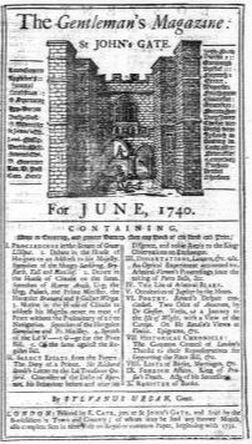
Authority Cited: Heigh [R.]
Author name and dates: R. Heigh (c.1718-fl.1740)
BKG Bio-tweet: St. John's College, Cambridge, education
Categories (list of works cited – preliminary) [BKG Note: the Carter and one Logie citation are also from the 1740 Gentleman's Magazine, of which SJ was editor.]
Author name and dates: R. Heigh (c.1718-fl.1740)
BKG Bio-tweet: St. John's College, Cambridge, education
Categories (list of works cited – preliminary) [BKG Note: the Carter and one Logie citation are also from the 1740 Gentleman's Magazine, of which SJ was editor.]
- Pharaoh's Daughter, Presented to the Right Honorable ______, Earl of Exeter, by Mr. R. Heigh, late of St. John's College, Cambridge in The Gentleman's Magazine, Vol. X, For June, 1740, London: Printed by E. Cave, jun. at St. John's Gate, and sold by the Booksellers in Town and Country; eloquence; generous; unfinished (the three cites are on p.312, added in 1773 Dict.) [BKG Note: see copied text of the poem below. The poem is presumably dedicated to Brownlow Cecil, 8th Earl of Exeter (4 August 1701 – 3 November 1754),]
- Heigh (no work cited); conspire (added in 1773 Dict.) Dict. quote: "So moist and dry when Phoebus shines,/Conspiring give the plant to grow."
P H A R A O H's DA U G HT E R.
Preſented to the Right Honoarable ----- Earl of
Exeter. By Mr R. Heigh, late of St. John's
College, Cambridge.
FAST by the margin of her native flood,
Whoſe fertile waters are well-known to fame,
Fair as the bord'ring flow'rs the princeſs ſtood,
And rich in bounty as the gen’rous ſtream.
When, lo! a tender cry afflićts her ear,
The tender cry declares an infant's grief;
Soon ſhe, who melted at each mortal's care,
With tend’reſt pity ſought the babe's relief.
The babe adorn'd in beauty's early bloom;
But to the laſt diſtreſs expos'd, appears;
His infant ſoftneſs pleads a milder doom,
And ſpeaks with all the eloquence of tears.
The kind Egyptian gaz'd upon his charms,
And with compaſſion view'd the weeping child;
She ſnatch'd the little Hebrew to her arms,
And kiſs'd the Infant---the ſweet Infant ſmil’d.
Again ſhe claſps him with a fond embrace, .
Yet more ſhe pities the young Stranger's woe;
She wip'd the tears that hung upon his face,
Her own the while in pious plenty flow.
Now, cruel father, your harſh law I ſee,
And feel that rigour which the Hebrews mourn;
O! that I could reverſe the dire decree,
Which doorns the babe a wretch as ſoon as born
But that, alas! exceeds my ſlender pow'r?
And muſt this tender Innocent be ſlain *
Poor harmleſs babe ; born in a luckleſs hour;
Yet ſweet as ever footh'd a mother's pain.
Muſt thou, poor undeſerving Infant, die?
No! in my boſom ev’ry danger ſhun ;
A Princeſs ſhall thy parent's loſs ſupply,
And thou art worthy to be call'd her ſon.
And now let conſcious Cecil view the piece,
where virtue in her lovelieſt light is ſhewn;
Let this unfiniſh'd tale in part expreſs,
your great forefather's bounty---and your own.
O! Could I equal theſe immortal lines,
Which flow from Moſes in the ſacred page;
As in his book the bounteous princeſs ſhines,
So ſhould your Fame deſcend to ev'ry Age.
But this vain thought is empty as a dream,
Yet happier Bards ſhall Cecil's honour raiſe;
The youth unborn ſhall bleſs the generous name,
And endleſs favours find an endleſs praiſe,